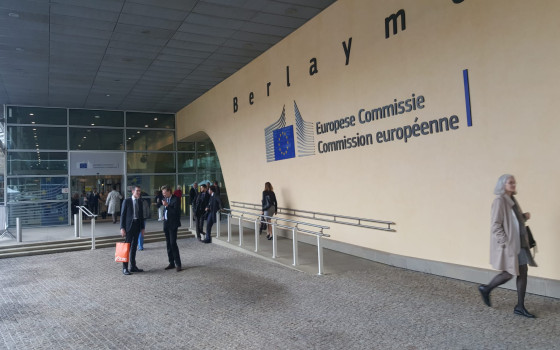The European Union signed a memorandum of understanding with Australia for a bilateral partnership for cooperation in the field of vital and strategic sustainable minerals... and a meeting with New Zealand within the framework of the partnership agreement on relations and cooperation.

- Europe and Arabs
- Tuesday , 28 May 2024 14:43 PM GMT
Brussels: Europe and the Arabs
The agreement was signed today, Tuesday, by European Commission Vice President and Trade Commissioner Valdis Dombrovskis, and Internal Market Commissioner Thierry Breton. On the Australian side, Minister of Resources, Madeleine King, and Minister of Trade and Tourism, Don Farrell, signed a memorandum of understanding for a bilateral cooperation partnership. According to a European statement, this partnership aims to support many common goals, on the basis of mutual benefit. In particular, the program seeks to enable the EU to diversify its supply of materials needed for green and digital transitions, while contributing to the development of Australia's vital domestic minerals sector. The partnership covers the entire critical and strategic minerals value chain: extractive waste exploration, extraction, processing, refining, recycling and processing.
In addition to jointly developing projects along the entire value chain in the EU and Australia, the partnership will also explore cooperation in countries where the EU and Australia have common interests, with a focus on reducing environmental impacts and benefiting local communities. In addition, it encourages innovative and digital technologies and services for mining and other projects along the value chain of critical minerals.
Areas of cooperation
This MoU strengthens cooperation between Australia and the European Union in the following areas:
Integration of sustainable value chains for raw materials, including communication and joint facilitation of projects (for example, through joint ventures), creation of new business models and promotion and facilitation of trade and investment linkages, ensuring the smooth functioning, sustainability and resilience of these linkages. Critical supply chains.
Collaboration on research and innovation along raw material value chains, including knowledge related to minerals and reducing the environmental and climate footprint.
Collaboration to promote high environmental, social and governance standards and practices, as well as improved policy alignment, driven by full respect for worker conditions and safety, and the need for sustainable and safe production of critical minerals.
The signing of the MoU provides a framework for building safe and sustainable value chains for critical and strategic minerals between the EU and Australia. These value chains will support clean energy and digital transformations and will be relevant to other key industrial sectors such as defense and aerospace.
The EU also uses bilateral free trade agreements to deepen trade and investment ties, diversify its supply chains, and enhance the resilience of its economy, especially in the context of important raw materials supply chains. The European Union already has the largest network of trade agreements in the world, with a total of 74 countries. Recent agreements with the United Kingdom, New Zealand and Chile contain a chapter dedicated to energy and raw materials. Negotiations on a free trade agreement between the European Union and Australia are currently underway.
Following the signing of the MoU, a roadmap containing concrete actions will be jointly developed to put the strategic partnership into effect over the next six months.
Given that critical raw materials are a prerequisite for achieving green and digital transitions, the Commission has begun building a series of partnerships on raw materials, following the Action Plan on Critical Raw Materials and the Critical Raw Materials Act, the Commission said. Such agreements were signed with Canada and Ukraine in 2021, with Kazakhstan and Namibia in 2022, with Argentina, Chile, Zambia, the Democratic Republic of the Congo and Greenland in 2023, and with Rwanda, Norway and Uzbekistan in 2024.
On the other hand, the European Union and New Zealand reaffirmed their strong bilateral relationship, at the joint committee meeting in Brussels yesterday, Monday.
At a meeting under the auspices of the Partnership Agreement on Relations and Cooperation, the European Union and New Zealand warmly welcomed recent important milestones that demonstrate the breadth and depth of their comprehensive relationship, such as the entry into force of the Free Trade Agreement on 1 May 2024. This move sends a strong signal of support for the rules-based trading system. At a difficult moment of increasing geopolitical tensions around the world. The Comprehensive Trade Agreement speaks to the shared values between the EU and New Zealand, such as meaningful climate action, economic and social sustainability, and provides a platform to further deepen our trading relationship and reduce non-tariff barriers.
The Commission welcomed New Zealand's accession to Horizon Europe's Research and Innovation Framework programme. The two sides look forward to more intensive cooperation, addressing global challenges such as climate change, digital adaptation, biodiversity protection, clean oceans, energy efficiency, public health, and others.














No Comments Found